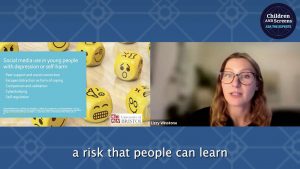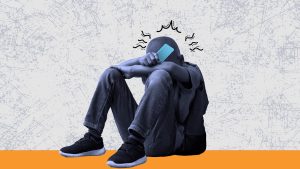
Lizzy Winstone, PhD (Population Health Sciences, University of Bristol, UK), shares the unique risks and benefits of digital media use for youth suffering from depression at #AskTheExperts webinar “Depression: Youth Mental Health and Digital Media” on October 18, 2023.
Read the Video Transcript
[Dr. Lizzie Winstone] Seeking social connection online is a common motivation for most people to use social media. But for those who might be struggling with their mental health, online forums and peer- peer feedback can be a really important source of support. For those who self-harm however, there can be a risk of self-harm getting normalized through discussions on these forums, a risk that people can learn about new methods of self-harm, and a risk of being inadvertently exposed to triggering material. Passive social media use, so that’s listening to music, watching videos, etcetera is commonly reported as a form of coping with distress or self-harm urges by means of a kind of temporary distraction or escape. Evidence suggests that many young people, but especially those with mental health difficulties, can struggle to self-regulate their social media use. Sometimes describing themselves as feeling “addicted.” It is worth bearing in mind, though, that those with depression may also be more inclined to ruminate or kind of more overestimate their own screen time.
View full webinar

Depression: Youth Mental Health and Digital Media
What relationship does digital media use have with depressive disorders in youth? Part two of a mental health series.
Mitch Prinstein, PhD, ABPP
Chief Science Officer, American Psychological Association
Vicki Harrison, MSW
Program Director, Center for Youth Mental Health and Wellbeing, Department of Psychiatry and Behavioral Sciences, Stanford University School of Medicine
Anne Maheux, PhD
Assistant Professor of Psychology and Neuroscience, The University of North Carolina at Chapel Hill; Winston Family Distinguished Fellow, Winston National Center on Technology Use, Brain, and Psychological Development
Janis Whitlock, PhD
Scientist Emerita, Cornell University; Founder and Director, Cornell Research Program on Self-Injury and Recovery
Lizzy Winstone, PhD
Population Health Sciences, University of Bristol, UK



